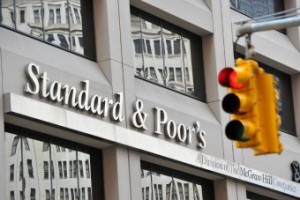Nigerian Economy gets Ratings Upgrade
Sub-Saharan Africa’s second largest economy Nigeria is on the path of great socio-economic transformation going by the recent ratings of internationally renowned credit rating agency Standards and Poors from ‘B+’ to ‘BB-‘ .
The agency believes the stable economic outlook resulting from the pursuit of viable economic reforms by the Government particularly in the Banking, Electricity and Fuel could really project and accelerate economic growth for the Nation.
It was noted that with no worsening political tension in the country, insurgence of the militia group ‘Boko Haram’, and no return to militancy in the Niger-Delta too will guarantee a steady growth potential.
The Government was praised by the S&P for tighter fiscal policy; and said that they may consider raising the Nation’s credit rating again ‘If authorities consistently improve fiscal performance and significantly enhance foreign currency reserves, if transparency in the oil sector and on the fiscal and external accounts improve substantially.
Earlier this week the Nigerian Government received the boost of the Moody rating another renowned credit rating agency improved its outlook assigning a Ba3 citing economic stability for the improved scorecard.
President Goodluck Jonathan had already set out a 2013 budget, which will peg spending at a modest benchmark oil price of $75 dollars per barrel, with all revenue earned above that price to be deposited in the excess crude account, which intended for savings.
The Nation’s fiscal assets in its excess crude account have risen to $8.4 billion(from US $2.0 billion at end- 2010), which provides a reasonable fiscal buffer,’ said S&P. ‘External buffers have also been rising on the back of high oil prices and strong exports, with foreign reserves standing at just above $42 billion as of November 1,2012.
S&P also warned that ‘if fiscal and external balances deteriorate’, they may lower Nigeria’s credit rating back to ‘B+’ again. Downward pressure could also build if reform stagnates, growth falters, or if political tensions and violence increase.
Related Posts
Latest News
-
FCMB Bank (UK) Limited Launches Personal and Business Banking Proposition to Deepen Inclusiveness
FCMB Bank (UK) Limited, an independently incorporated subsidiary of First...
- Posted August 1, 2018
- 0
-
The Worrisome Trend of Sensational Social Media “Journalism” and the Impact On Legitimate Business Concerns: Recent Travails of FCMB, GTBank and First Bank
On June 25, 2018 I woke up to yet another...
- Posted June 26, 2018
- 0
-
FCMB attains ISO Certification for Quality Management
Leading financial services provider, First City Monument Bank (FCMB), has...
- Posted May 16, 2018
- 0
-
Over 1,000 firms bid for 2017 railway projects
Over 1000 companies expressed interest in 17 categories of projects...
- Posted October 20, 2017
- 2
-
NAICOM moves to enforce compulsory insurance of public buildings
To drive the enforcement of the compulsory insurance of public...
- Posted October 20, 2017
- 11
-
Reps ask NPA to reverse termination of agreement with Intels
The House of Representatives yesterday waded into the ongoing controversy...
- Posted October 19, 2017
- 1
-
SEC suspends Oando shares from stock market
The Securities and Exchange Commission has ordered the Nigerian Stock...
- Posted October 19, 2017
- 1
-
FCMB Bank (UK) Limited Launches Personal and Business Banking Proposition to Deepen Inclusiveness
FCMB Bank (UK) Limited, an independently incorporated subsidiary of...
- August 1, 2018
- 0
-
The Worrisome Trend of Sensational Social Media “Journalism” and the Impact On Legitimate Business Concerns: Recent Travails of FCMB, GTBank and First Bank
On June 25, 2018 I woke up to yet...
- June 26, 2018
- 0
-
Azman Air commences flight operation in Sokoto
Azman Air Thursday commenced flight operation to Sokoto state....
- February 21, 2015
- 424
-
NRC increases Lagos goods trains, eyes fuel haulage
The Nigerian Railway Corporation says it has increased its...
- June 23, 2016
- 100
 Nigeria News
Nigeria News
- Quality of Nollywood movies has dropped – Actor Francis Odega
- Chukwunweike, 36 others elected Enugu APC excos
- EPL: Bruno Fernandes gives Man Utd two conditions to stay at club
- 33 vessels laden with petroleum products, goods set to arrive Lagos ports
- War: ‘We’ll cut all ties with them’ – Trump blows hot as Spain blocks US from using bases to attack Iran









